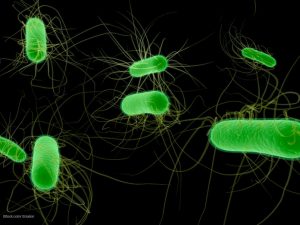Researchers at North Dakota State University may have found a way to fight pathogenic E. coli bacteria. They discovered that B-phenylethylamine (PEA), a mood enhancer, reduces the number of E. coli cells in beef broth. PEA is the substance in chocolate that makes you feel good.
 PEA also reduced the amount of E. coli biofilm in beef broth. Biofilm is a collection of bacteria enclosed in an exopolysaccharide matrix that makes the pathogen much more dangerous, since it helps the bacteria protect each other and communicate. Bacteria in biofilms cause 60 to 80% of bacterial infections. And biofilms restrict the diffusion of antimicrobials.
PEA also reduced the amount of E. coli biofilm in beef broth. Biofilm is a collection of bacteria enclosed in an exopolysaccharide matrix that makes the pathogen much more dangerous, since it helps the bacteria protect each other and communicate. Bacteria in biofilms cause 60 to 80% of bacterial infections. And biofilms restrict the diffusion of antimicrobials.
When exposed to PEA, E. coli bacteria can’t produce flagella, the thin appendages that they use to move, bind together, and attach to surfaces. If they can’t bind together, they cannot produce a biofilm and cannot protect themselves against antibiotics and antimicrobial compounds.
The research identified genes that will become targets of the biofilm prevention efforts. The first targeted gene, FihD/FihC, is a regulator of flagella. Dr Birgit Pruess, NSDU associate professor and researcher, said, “the identification of the first target, as well as the first bacterial nutrient that will inhibit biofilm formation, are major breakthroughs on the path to the development of novel biofilm prevention techniques.”
Researchers think that PEA could be used in food packaging. Material could be developed in a few years. But because of the government shutdown, the next research step has been postponed. The research was funded by a $358,750 grant from the National Institutes of Health, as well as the North Dakota Board of Agricultural Research and Education, and the North Dakota Beef Commission.




